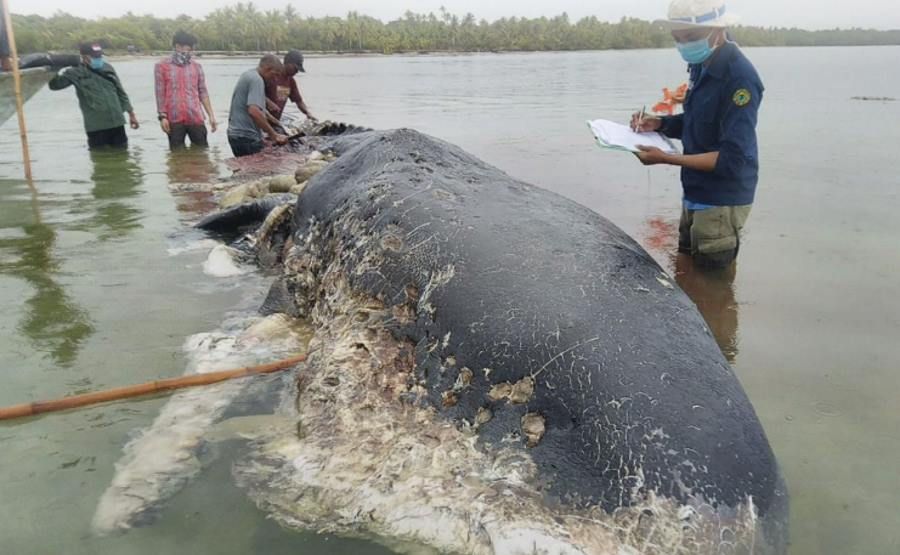Dead whale found on beach had 6 kilograms of plastic in its stomach
A dead sperm whale washed ashore on Kapota Island in Wakatobi National Park in Indonesia by the sea. Nearly six kilograms of plastic were found in its stomach, including plastic bottles, commercials, more than 100 plastic cups and even flip-flops.
A dead whale was found on Monday póIn the late afternoon. The nearly 10-meter-long animal had already died some time ago, judging by the advanced decomposition of its body. Therefore, experts have not decided to confirm any specific cause of death of the sperm whale. Although nearly six kilogramsóIn the plastic in its belly mósees for itself.
The contents of the stomach caused consternation among theód environmentalistów. Found in it are 4 plastic bottles, 25 adsówks and smaller plastic bags, 115 plastic cupsów, nylon ropes and ribbons, and even a pair of flip-flops. In total, more than 1,000 pieces ofóin plastic weighing a total of 5.9 kilograms.
– Although we have not been able to deduce the cause of death, the facts które we see, they are really awful,” said Dwi Suprapti, coordinator of the species protectionóin the sea in WWF Indonesia. Earlier in the ty, two other dead whales were found, któwhose stomachs were filled with plastic waste.
In April, a 10-meter-long sperm whale was found on a beach in Spain with 29 kilograms of plastic trash in its belly. Experts determined that the animal died because it could not digest or excrete the ingested plastic. In June in Thailand, the sea washed ashore a grindworm in którego stomach contained 7.7 kilograms of wasteów of plastic. Cause of death according to expertów was the same.
5.9 kg sampah plastic ditemukan di dlm perut paus malang ini! Sampah plastic yaitu: keras plastic (19 pcs, 140 gr), botol plastic (4 pcs, 150 gr), kantong plastic (25 pcs, 260 gr), sandal jepit (2 pcs, 270 gr), didominasi o/ tali rafia (3.26 kg) & gelas plastic (115 pcs, 750 gr). pic.twitter.com/ZFWZgkbnzu
— WWF-Indonesia (@WWF_ID) November 19, 2018
Trash accumulations in the seas and oceans have become quite a problem in recent years. Refers to particularólnie someórych countryóIn Southeast Asia, including Indonesia. Five Asian countriesóin – China, Indonesia, the Philippines, Vietnam and Thailand – accounts for 60 percent of the. wasteów of plastic, whichóre they end up in the oceanów.
According to the organization Rivers, Oceans, Lakes and Ecology (ROLE), Indonesia produces about 130,000 tons of plastic wasteów per day. Some of it ends up in landfills, but the rest is either burned or dumped into rivers, with którym goes into the ocean. As reported by ROLE, the government’s poor waste management and the population’s low level of awareness about wasteóin and recycling, making Indonesia the world’s second-largest contributor to environmental degradation by plastic waste. Right after China.
Earlier this year, a British diver published a krótki video taken off the coast of the Indonesian tourist resort of Bali, on which theórim can be seen „clouds” plastic wasteów. Ocean currents have brought us into a beautiful area abundant with jellyfish, plankton, leaves, branches, sticks, and some plastic. Plastic bags, bottles, cups, foil, plastic buckets, sachets, straws, baskets, plastic bags, more plastic bags, plastic, plastic, plastic, plastic!” – wrote in the description of the footage a diver.
Scientists believe that plastic waste kills hundreds of thousands of marine animals each year. There are currently an estimated 5.25 trillion in the oceansóin a chunk ofóin the plastic. Some of this mass floats on the surfaces of the oceanóin forming large clusters of debris. It is not a dense mass of. These marine „dumps” are more like a suspension. They form the mainównie plastics, the vast majority of which is a photodegradable material, który does not decompose in its entirety. Tiny particles are left behind. These are the remains of larger, plastic objectsów, które have been torn to bits by the sun, waves and other factorsów. Wind and ocean currents collect plastic debris, resulting in the formation of huge islands.
These tiny particles are mistaken by sea creatures and often linger in their digestive tracts. ŻóSea lions mistake plastic bags for jellyfish, które their delicacy. Dolphins become entangled in old fishing nets. Now whales have also been affected by the problem. It is estimated that more than a million birds die because of thisów and 100,000 mammalsóin a year.
Sourceósource: BBC, WWF, fot. Indonesia’s Ministry of Environment and Forestry
